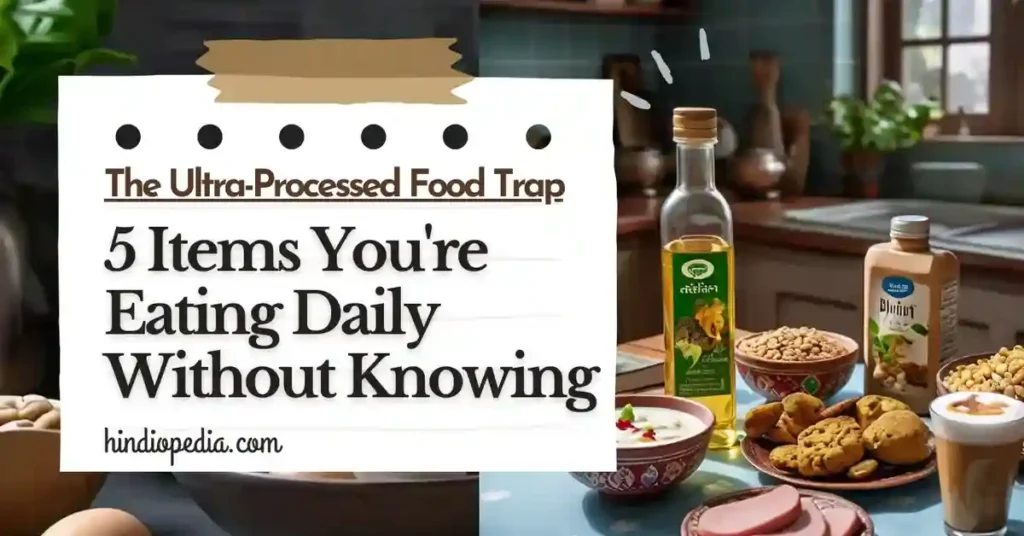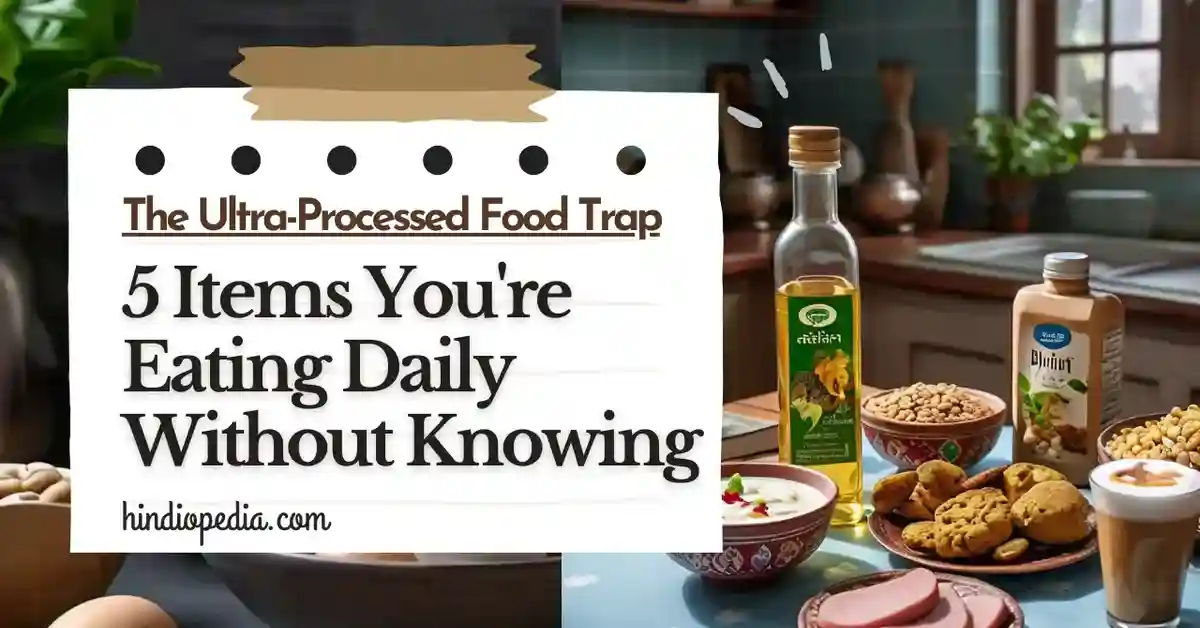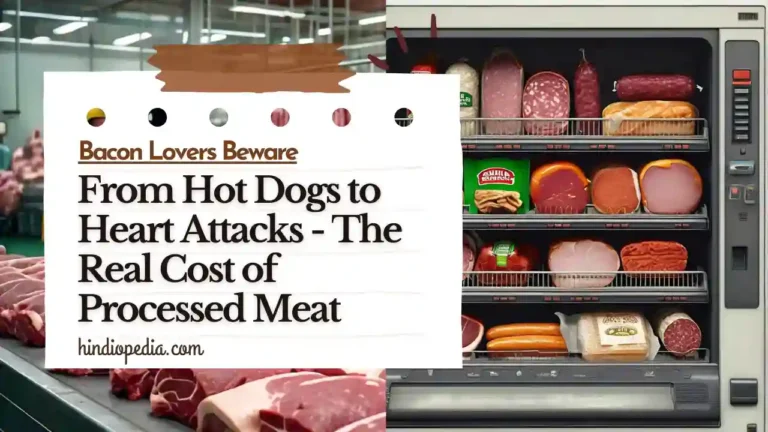5 Surprising Ultra-Processed Foods You Might Be Eating Daily | Exposed
Ultra-processed foods are everywhere. They’re convenient. They’re tasty. But they’re not always obvious. Many people consume these foods daily without realizing it. This article will reveal five surprising ultra-processed foods you might be eating regularly. We’ll explore what makes them ultra-processed. We’ll also discuss their potential health impacts.

What Are Ultra-Processed Foods?
Ultra-processed foods are industrial formulations. They contain little to no whole foods. Instead, they’re made from substances extracted from foods or synthesized in laboratories. These foods often have five or more ingredients. Many of these ingredients are not commonly used in home cooking.
The NOVA classification system defines ultra-processed foods. It was developed by researchers at the University of São Paulo, Brazil. This system categorizes foods based on their level of processing. Ultra-processed foods fall into the fourth and most processed category.
Characteristics of ultra-processed foods include:
- Long ingredient lists
- Ingredients you wouldn’t find in a typical kitchen
- High in added sugars, salts, and unhealthy fats
- Low in fiber and nutrients
- Designed to be convenient and hyper-palatable
Now, let’s explore five surprising ultra-processed foods you might be consuming daily.
1. Flavored Yogurt
Yogurt is often considered a healthy food. It’s rich in protein and probiotics. But not all yogurts are created equal. Many flavored yogurts are ultra-processed.
Why it’s ultra-processed:
- Contains added sugars
- Often includes artificial flavors and colors
- May contain thickeners and stabilizers
A study published in the British Medical Journal found that high consumption of ultra-processed foods, including flavored yogurts, was associated with a higher risk of cardiovascular disease.
Healthier alternative: Plain, unsweetened yogurt with fresh fruit.
2. Breakfast Cereals
Breakfast cereals are a staple in many households. They’re quick. They’re easy. But many are ultra-processed.
Why they’re ultra-processed:
- Often made from refined grains
- High in added sugars
- May contain artificial colors and flavors
- Often fortified with synthetic vitamins and minerals
A study in the journal Nutrients found that regular consumption of ultra-processed foods, including breakfast cereals, was associated with an increased risk of obesity.
Healthier alternative: Oatmeal with nuts and fresh fruit.
3. Vegetable Oils
Vegetable oils are common in cooking. They’re used in many processed foods. But they’re often ultra-processed.
Why they’re ultra-processed:
- Extracted using chemical solvents
- Heavily refined
- May be hydrogenated to increase shelf life
A review published in the journal BMJ Open found that increased consumption of ultra-processed foods, including those high in vegetable oils, was associated with a higher risk of all-cause mortality.
Healthier alternative: Extra virgin olive oil or avocado oil.
4. Plant-Based Meat Alternatives
Plant-based meats are growing in popularity. They’re often marketed as healthy alternatives. But many are ultra-processed.
Why they’re ultra-processed:
- Often contain extracted plant proteins
- May include artificial flavors and colors
- Often high in sodium
- May contain numerous additives for texture and shelf life
A study in the American Journal of Clinical Nutrition found that ultra-processed foods, including some plant-based meat alternatives, were associated with weight gain and increased calorie intake.
Healthier alternative: Whole plant proteins like beans, lentils, or tofu.
5. Flavored Coffee Drinks
Coffee itself isn’t ultra-processed. But many flavored coffee drinks are.
Why they’re ultra-processed:
- Often contain added sugars or artificial sweeteners
- May include artificial flavors and colors
- Often contain emulsifiers and stabilizers
A study published in JAMA Internal Medicine found that higher consumption of ultra-processed foods, including sweetened beverages, was associated with a higher risk of cardiovascular disease and mortality.
Healthier alternative: Black coffee or coffee with a small amount of milk or plant-based milk alternative.
Health Impacts of Ultra-Processed Foods
Regular consumption of ultra-processed foods has been linked to various health issues. Here’s a brief overview:
| Health Issue | Research Findings |
|---|---|
| Obesity | A study in Cell Metabolism found that people eating ultra-processed foods consumed more calories and gained more weight than those eating unprocessed foods. |
| Heart Disease | Research published in the BMJ linked high consumption of ultra-processed foods to increased risk of cardiovascular disease. |
| Type 2 Diabetes | A study in JAMA Internal Medicine associated higher consumption of ultra-processed foods with increased risk of type 2 diabetes. |
| Cancer | Research in the BMJ found a significant association between consumption of ultra-processed foods and overall cancer risk. |
| Depression | A study in Molecular Psychiatry linked ultra-processed food consumption to increased risk of depression. |
How to Reduce Ultra-Processed Foods in Your Diet
Reducing ultra-processed foods can be challenging. They’re convenient and often tasty. But there are strategies to cut back:
- Read ingredient labels. Look for short lists with recognizable ingredients.
- Cook more meals at home. This gives you control over ingredients.
- Choose whole foods. Opt for fruits, vegetables, whole grains, and lean proteins.
- Plan meals in advance. This can reduce reliance on convenient, ultra-processed options.
- Gradually replace ultra-processed foods with less processed alternatives.
The Bottom Line
Ultra-processed foods are more common than you might think. They’re not just junk food. Many seemingly healthy options are ultra-processed too. Being aware of these foods is the first step. Understanding their potential health impacts is crucial. Making informed choices can lead to a healthier diet.
Remember, small changes can make a big difference. You don’t have to eliminate all ultra-processed foods overnight. Start by identifying them in your diet. Then, gradually replace them with less processed alternatives.
References
- Monteiro, C. A., et al. (2019). Ultra-processed foods: what they are and how to identify them. Public Health Nutrition, 22(5), 936-941.
- Srour, B., et al. (2019). Ultra-processed food intake and risk of cardiovascular disease: prospective cohort study (NutriNet-Santé). BMJ, 365, l1451.
- Hall, K. D., et al. (2019). Ultra-Processed Diets Cause Excess Calorie Intake and Weight Gain: An Inpatient Randomized Controlled Trial of Ad Libitum Food Intake. Cell Metabolism, 30(1), 67-77.e3.
- Fiolet, T., et al. (2018). Consumption of ultra-processed foods and cancer risk: results from NutriNet-Santé prospective cohort. BMJ, 360, k322.
- Adjibade, M., et al. (2019). Prospective association between ultra-processed food consumption and incident depressive symptoms in the French NutriNet-Santé cohort. BMC Medicine, 17(1), 78.






